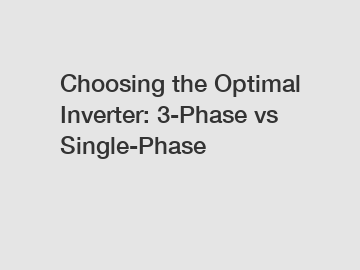Choosing the Optimal Inverter: 3-Phase vs Single-Phase
Choosing the Optimal Inverter: 3-Phase vs Single-Phase?
When it comes to selecting the right inverter for your electrical system, one of the crucial decisions to make is whether to opt for a 3-phase or a single-phase inverter. This choice can significantly impact the efficiency, reliability, and cost-effectiveness of your power conversion system. To help you in this decision-making process, let's explore the advantages and considerations of both options in detail.
1. Understanding the Basics:

- Single-Phase Inverter: A single-phase inverter converts DC (Direct Current) power into single-phase AC (Alternating Current) power. It is suitable for low power applications such as residential homes, small offices, or small businesses.
- 3-Phase Inverter: A 3-phase inverter also converts DC power into AC power, but it generates three-phase power. It is commonly used in industrial setups, commercial buildings, and larger-scale operations.
2. Power Capacity:
- Single-Phase: Single-phase inverters offer power capacity typically up to 5 kW for residential applications. This makes them ideal for smaller loads like household appliances or small office equipment.
- 3-Phase: In contrast, 3-phase inverters are capable of supporting much higher power capacities, ranging from a few kilowatts to several megawatts. They are better suited for heavy electrical machinery, industrial processes, or large commercial buildings.
3. Efficiency and Power Quality:
- Single-Phase: While single-phase systems are simpler and less expensive, they are generally less efficient compared to 3-phase inverters. Moreover, the power quality provided by single-phase inverters may not be as stable, leading to voltage dips and potential disruptions to sensitive equipment.
- 3-Phase: 3-phase inverters offer higher energy efficiency due to better load balancing across the power grid. Additionally, the power quality they provide is more stable, resulting in enhanced reliability and reduced downtime for critical systems.
4. Scalability and Flexibility:
- Single-Phase: Single-phase inverters are relatively limited when it comes to scalability. They are best suited for individual applications and are not easily expandable.
- 3-Phase: 3-phase inverters offer greater flexibility and scalability, allowing for the addition of more power-hungry loads without overloading the system. This makes them the preferred choice for future expansions or industrial processes that require increased power capacity.
5. Cost Considerations:
- Single-Phase: Single-phase inverters are generally less expensive upfront, making them an attractive option for small-scale applications with limited budgets. However, it's important to consider the potential cost implications of future power demands and scalability limitations.
- 3-Phase: While 3-phase inverters may have higher initial costs, they provide greater long-term cost-effectiveness. Their energy-efficient operation, ability to handle larger loads, and potential for future expansion make them a sound investment for businesses and industries.
Conclusion:
In conclusion, choosing between a 3-phase and a single-phase inverter depends on various factors such as power requirements, load types, scalability, and your budget. For smaller residential or low power applications, a single-phase inverter may be sufficient. However, for larger-scale operations, industrial setups, or future expansions, a 3-phase inverter offers higher efficiency, improved power quality, flexibility, and long-term cost-effectiveness. It's essential to carefully consider your specific needs and consult with experts to ensure selecting the optimal inverter for your electrical system. So, when it comes to choosing the optimal inverter, don't overlook the significance of the 3-phase vs. single-phase decision, as it can greatly impact the performance and success of your power conversion system.
If you are looking for more details, kindly visit residential three phase inverters for house, 3 phase inverter for solar panels, solar inverter 3 phase.


